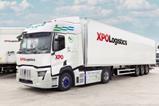As orginally reported in Motor Transport, DHL Supply Chain has announced a swift and comprehensive shift from diesel to hydrotreated vegetable oil (HVO) at all its on-site fuelling stations by the end of the next month. This ambitious move is a key component of the company’s decarbonization strategy, aiming to achieve between 80-90% carbon savings, equivalent to 15,000 tonnes of CO2. Over six million liters of HVO fuel will replace diesel in 20 locations across the UK this year, with plans to install additional fuel bunkers in 2024, increasing HVO fuel usage to over 24 million liters. This initiative reflects DHL’s commitment to immediate and substantial carbon savings as it continues to explore viable zero-emission alternatives.

DHL Supply Chain said it would transition its entire on-site fuelling stations from diesel to hydrotreated vegetable oil (HVO) by the end of next month in a rapid acceleration of its decarbonisation strategy.
It believed the wholesale move towards HVO fuel would deliver between 80-90% of carbon savings, equating to 15,000 tonnes of co2 equivalent.
More than six million litres of HVO fuel will be rolled out within DHL’s on-site fuelling stations this year, replacing diesel in 20 locations across the UK.
In 2024, the business plans to install additional fuel bunkers across its network, increasing its use of HVO fuel to over 24 million litres, and with the effect of a full year, the carbon savings impact will be even greater.
Saul Resnick, chief executive, DHL Supply Chain UK & Ireland, said: “The installation of HVO fuel across our bunkered sites represents a critical moment in our multi-fuel decarbonisation strategy.
“HVO improves our service to customers by introducing a low-carbon renewable alternative fuel with minimal disruption.
“As an industry leader, we are rolling out HVO at scale and with impressive pace, to deliver immediate and substantial carbon savings while we continue to work towards viable zero-emission alternatives.”
HVO is widely viewed as one of the best fossil-free transitionary fuels available and the ease with which it can replace diesel with no vehicle modifications is seen as a huge plus.
However, doubts have been cast on both its availability and its price.
One major tanker operator recently told Motor Transport it had decided against using HVO across its fleet because “the more you look into it, the more challenges you face”.
The operator added: “You have to look at the economics and weigh it up against what the customer wants to pay. And when you look at the economics, they don’t stack up.”
Supply concerns will not have been allayed by the UK’s largest supplier of HVO, Green Biofuels, calling in the administrators in October following cash flow issues.
Asked who DHL would be rely on to provide it with the alternative fuel, a spokeswoman said: “We can’t discuss the commercial details of our contracts other than to say we have a stable and secure supply.”


















